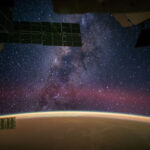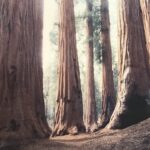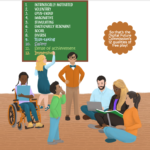
photo by Poh Wei Chuen
I’ve been spending time with a five-month-old human. A few nights ago I watched her touch her tongue to the wood floor. She took the sensation in, and then did it again, leaving a small pool of saliva as trace. She’s thrilled to see the dog. Her eyes follow the dog’s every movement, as she tries in any way she can to get closer. She’s especially intrigued by that wagging tail. She loves the Tiffany-style lamp shade that hangs from the ceiling in the living room. She leans back to look at it again and again. She strums the strings on the guitar that her dad brings close to her to touch. Even the soft strum with her tiny hand resonates. And the loud strum she manages sounds its note loud and clear. She enjoys sitting on a lap while someone turns the pages of a board book with colorful illustrations of this creature and that. Through her eyes, I can see, hear, smell, touch, taste the world. I experience the slow and steady efforts of hands learning to grasp. I discover a new way to breathe.
I appreciate even more the school founders, researchers, and everyday folk who advocate and articulate the need for more play in the worlds of children, for unstructured time and spacious transitions (for example), and for deep connection to the natural world.
24 hours, governed by sunrise, sunset, and the need for sleep. The hours fly, don’t they?
People ask me, “What do you think about interactive books and devices for young children?” It’s not that I think they’re bad. Actually, I think they’re too good at what they do—as in the way the shiny catches your eye and holds it.
Soon enough, young children can enter that remarkable space crafted of zeroes and ones—where they’ll create their own characters and stories, and art, and music, and games, and code, and robots, and worlds…and when they do, they’ll have feet that have walked barefoot in creeks, noses that can pick up the scent of jasmine and momentarily swoon, eyes that revel in the first morning light, touch that knows how to soothe a stressed out rescue dog, and ears that recognize the cautious chatter of a squirrel announcing a cat on the prowl.

photo by Jelleke Vanooteghem
Best in tech this week: REMA, the Reference Elevation Model of Antarctica. It is the most accurate high-resolution terrain map of Antarctica ever created. “Up until now, we’ve had a better map of Mars than we’ve had of Antarctica,” said Ian Howat, professor of earth sciences and director of the Byrd Polar and Climate Research Center at Ohio State University. “Now it is the best-mapped continent on Earth.” The REMA website is here. Take some time to explore it.
What I am reading: I’m still reading Kevin Kelly’s book, The Inevitable (and it’s still not too late to join us for a conversation about it…just let me know you are interested and I’ll schedule a video call with a few of us).
What I’m listening to: I’m listening to the Educate podcast, and in particular, this episode by Emily Hartford, Hard Words: Why aren’t kids being taught to read? I recommend you listen if you live with or work with young readers and pre-readers. It’s 52 minutes long. The time goes by quickly. It’s worth it.
What I’m watching: Nir Eyal’s talk on developing traction amidst oceans of distraction. It’s 27 minutes long. Worth every minute of your time. “Studies find that the #1 criteria that determines whether someone can reach their long term goals is their belief in their own power to do so. So when we call technology addictive and say it’s hijacking our brain and it’s irresistable, we are giving it more power and more control than it deserves. We all have the power to manage distraction. We can all become indistractable.” He presents his model for managing distractions, based on his own work in behavioral design. His new book, Indistractable, will be published Dec. 31.
Got privacy? You might want to doublecheck.
Events: If you’re local to the San Francisco Bay Area, I’ll be doing a workshop on Mindful Digital Life October 13 at the Julia Morgan School for Girls on the Mills College Campus as a part of Parenting U. Details coming soon. Registration is open.


